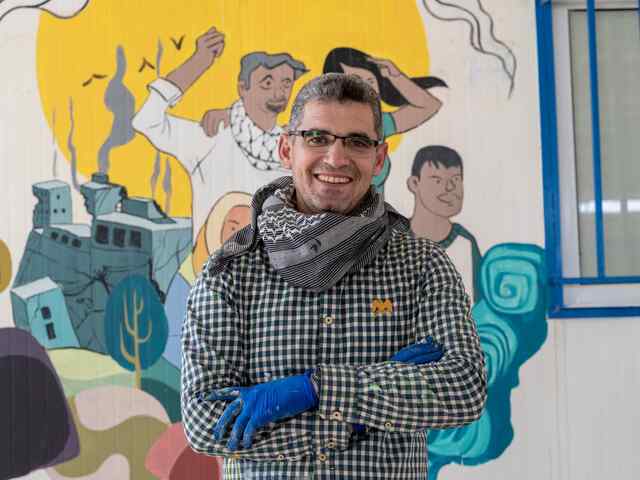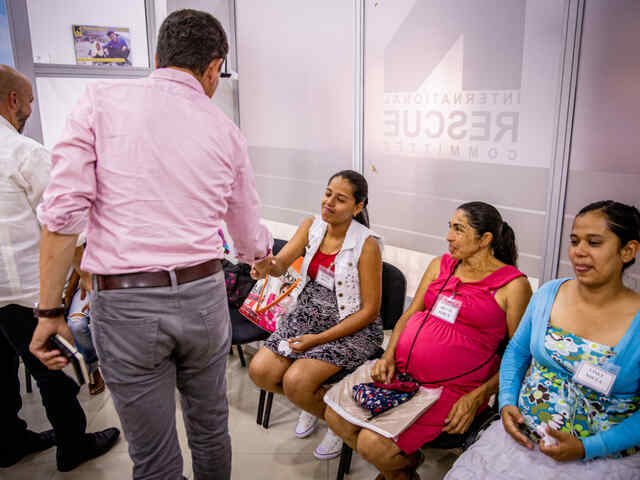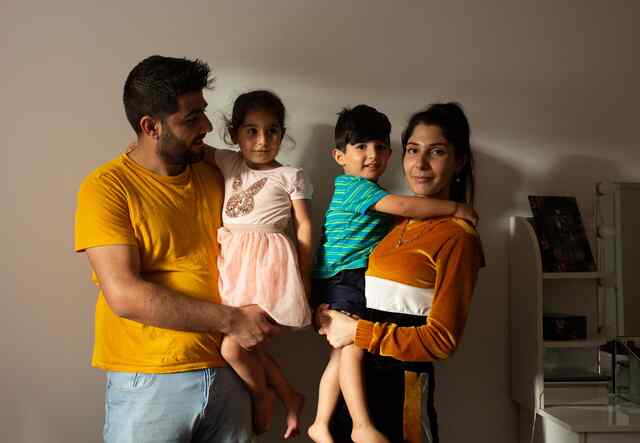
Who is a refugee? What’s the difference between refugees and asylum seekers? How many refugees live in the UK? Which countries host the most refugees? Find out the answers to these commonly asked questions and get the real facts and statistics about refugees.
5 facts about refugees
1. High-income countries host just 24% of refugees
The world’s wealthiest countries like the United States and United Kingdom host just 24% of the world’s refugees. The remaining 76% are hosted by poor low and middle-income countries. For example, Turkey is currently the single biggest host country for refugees (UNHCR). Most refugees living in Turkey come fromSyria, where an ongoing civil war has now lasted for over 12 years.

2. 70% of refugees live in neighbouring countries
Media coverage of refugees focuses on those making long journeys to reach the UK, but most refugees live in places immediately bordering their home country. For example, Jordan hosts 1.3 million refugees from neighbouring Syria.
3. Over half of refugees come from three countries globally
52% of all refugees in the world came from just three countries by the end of 2022: Syria, Afghanistan, and Ukraine.
4. There is an international agreement to protect refugees
149 countries have agreed to protect refugees under the 1951 Refugee Convention. This agreement was introduced following the events of World War Two, when many people fled persecution and conflict in Europe.
5. Seeking asylum is a universal human right
The right for refugees to seek asylum in another country is included in the Universal Declaration of Human Rights alongside the right to a fair trial and freedom of expression.
Frequently asked questions about refugees
Who is a refugee?
The definition of a refugee is someone who has been forced to leave their country in order to escape war and persecution. They are unable to return home until conditions are safe for them again.
This definition comes from The 1951 Refugee Convention, in which a refugee is defined as someone who has a well-founded fear of persecution for reasons of race, religion, nationality, political opinion or membership in a particular social group.
Which countries protect refugees?
149 countries around the world have signed The Refugee Convention, agreeing to protect refugees.
What’s the difference between refugees and asylum seekers?
A refugee is someone who has been forced to flee his or her country because of persecution, war or violence, whereas asylum seekers are people who are in the process of claiming protection in another country. Once an asylum claim is recognised by a host country then they can live in their host country as a refugee.
Does everyone have the right to seek asylum?
Yes, the right to seek asylum is recognised as a universal human right. Article 14 of the Universal Declaration of Human Rights states that “Everyone has the right to seek and to enjoy in other countries asylum from persecution.” Other human rights in this declaration include the right to life, the right to privacy, and the right to a fair trial without discrimination.
Do people have to claim asylum in the first country they reach?
No, they do not. The 1951 Refugee Convention, which is the basis of asylum laws around the world, does not require that a person must claim asylum in the first safe country they reach.
67% of the UK public would want to choose which country they sought asylum in according to new polling carried out by the IRC and YouGov in June 2023.
Where do refugees come from around the world?
Refugees primarily come from countries affected by conflict or where people are being persecuted for their ethnicity, religion, politics or sexual orientation.
Globally, over half of all refugees come from just three countries:
- Ukraine
- Syria
- Afghanistan
Which countries host the most refugees?
Turkey
Turkey hosts more refugees than any other country. The majority of refugees living there having fled from neighbouring Syria where the civil war has lasted over 12 years. The IRC has been supporting refugees in Turkey since 2013 and now has over 1000 staff working within Syria.
Iran
The second largest host country is Iran, where many refugees from Afghanistan are hosted. IRC staff in Afghanistan provide critical support including malnutrition treatment and economic assistance. The IRC is also working to resettle Afghan refugees in the U.S. with 11,000 people resettled in 2021.

Colombia
Colombia has become one of the largest hosts for displaced people globally. To date, over 2.5 million people have arrived in Colombia from neighbouring Venezuela. These are people in need of protection, including refugees, migrants, and people in different situations. The IRC is supporting Venezuelans in Colombia, Peru and Ecuador, providing services such as health assistance and economic support.
What is meant by “safe routes” for refugees?
Refugees can sometimes apply to a government scheme and arrange to travel to a safe country before they arrive in that country. These schemes organised by governments to support refugees fleeing war and persecution are known as safe routes. However, there are very few safe routes of this kind available to the vast majority of refugees. The IRC is advocating for an expansion safe routes and resettlement programmes in the UK, US, and EU.
Read more about UK resettlement figures below.
Frequently asked questions about refugees in the UK
How many refugees are there in the UK?
Refugees make up less than half a percent of the UK population (0.49%). According to the UN, there were 328,989 refugees living in the UK by the end of 2022.
How long can refugees live in the UK?
Refugees are granted five years leave to remain in the UK. After five years they can apply to remain indefinitely if they still wish to continue to live in the UK.
Where do refugees in the UK come from?
By the end of 2022, over half of the refugees living in the UK came from Ukraine (55%), with others coming primarily from Iran, Eritrea, Syria, Sudan and Afghanistan.
Can refugees work in the UK?
Yes, refugees have the right to work in the UK and the same applies in the EU and US. In fact, refugees have the right to work in all 149 countries that have signed the 1951 Refugee Convention.
However, refugees with the right to work in the UK often encounter practical barriers to doing so. These include developing English language skills, administrative barriers, and unfamiliarity with specifics of UK job market.
The IRC is calling for the Government to create a National Integration Strategy for refugees and provide better integration services for refugees. Read our report: From Harm to Home: How the UK Government can strengthen refugee resettlement and integration
Can asylum seekers work in the UK?
Asylum seekers waiting for their claim to be processed are not allowed to work in the UK despite 68% of businesses being in favour of a policy allowing for this. People seeking asylum could positively contribute to the economy through consumer spending and paying tax. It is estimated that the UK economy could gain £333 million per year if the ban were lifted.
Stories behind the stats

Kurdish-Syrian refugees Maasom and Hiba moved to the UK through a resettlement scheme. Their daughter Nasrin was born in a refugee camp in Iraq with a serious heart condition, which led to them applying for resettlement in the UK where Nasrin could access treatment. They were resettled in the UK through the Syrian Vulnerable Persons Resettlement Scheme. The IRC was there to help them rebuild their life in the UK. Read Nasrin’s story.
What is the International Rescue Committee (IRC)?
The International Rescue Committee (IRC) helps people whose lives have been shattered by conflict and disaster to survive, recover and rebuild. Founded in 1933, we now work in over 40 crisis-affected countries as well as communities throughout the UK, Europe and the Americas.